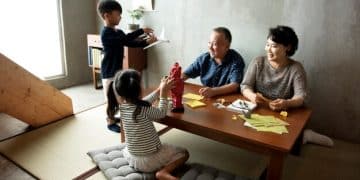Korean Parenting Styles: Lessons for US Parents in 2025

Korean parenting styles, characterized by high expectations and a strong emphasis on education, offer US parents valuable insights into fostering resilience, academic success, and close family bonds, particularly relevant in shaping children’s futures by 2025.
In an increasingly interconnected world, parents are constantly seeking effective strategies to nurture successful and well-adjusted children. Exploring Korean parenting styles: What US parents can learn in 2025 offers a unique perspective on fostering academic excellence, strong family values, and emotional resilience in the next generation.
Understanding the Core Principles of Korean Parenting
Korean parenting, often rooted in Confucian principles, emphasizes respect for elders, academic achievement, and familial harmony. Understanding these core values provides a foundation for US parents to adapt and integrate beneficial strategies into their own parenting approaches.
The Emphasis on Education (“Eeducation Fever”)
In South Korea, education is highly valued and seen as a pathway to success. Parents often invest significant time and resources to ensure their children receive the best possible education from a young age.
The Role of “Jeong” (Emotional Bond)
“Jeong” describes a deep, emotional connection and sense of empathy within the family. Korean parents prioritize nurturing this bond, which fosters a sense of security and belonging for their children.
- Filial Piety: Respect and care for parents and elders are paramount.
- High Expectations: Korean parents typically set high standards for their children’s academic and personal achievements.
- Group Harmony: A focus on contributing to the family and community well-being.
By understanding the principles behind Korean parenting, US parents can begin to adapt these concepts to suit their own cultural values and family dynamics, emphasizing both achievement and emotional well-being.
Key Differences Between Korean and US Parenting Styles
While both Korean and US parents share the goal of raising happy and successful children, their approaches often differ significantly. Understanding these differences can highlight areas where US parents can learn and grow.
Approach to Independence
In US parenting, there is a strong emphasis on fostering independence from a young age. Children are encouraged to make their own decisions and express their individuality. In contrast, Korean parenting often prioritizes interdependence and a strong connection to the family unit.
Discipline Techniques
US parenting styles often lean towards positive reinforcement and open communication when addressing behavior issues. Korean parents may employ more traditional disciplinary methods, emphasizing respect for authority and avoiding shame upon the family.

- Emphasis on Academics: Korean parents tend to place a higher priority on academic achievements, while US parents may prioritize extracurricular activities and social skills.
- Communication Styles: US parenting often encourages open dialogue and negotiation, while Korean parenting may follow a more hierarchical communication structure.
- Parental Involvement: Korean parents are often highly involved in their children’s education, even into older ages, while US parents may gradually give their children more autonomy.
Ultimately, recognizing these differences allows US parents to thoughtfully evaluate their own parenting methods and consider adopting elements from Korean parenting that align with their family values and goals.
The Benefits of Academic Focus: What US Parents Can Adopt
One of the most notable aspects of Korean parenting is the strong emphasis on academics. While it’s crucial to avoid excessive pressure, there are several benefits to this approach that US parents can consider incorporating into their own parenting strategies.
Creating a Structured Learning Environment
Korean parents often create a structured and supportive learning environment at home. This may include dedicated study spaces, regular homework assistance, and involvement in after-school programs.
Instilling a Growth Mindset
A growth mindset focuses on the belief that intelligence and abilities can be developed through dedication and hard work. Korean parents often encourage this mindset, emphasizing effort and perseverance over innate talent.
- Early Education: Investing in quality early education can provide children with a strong foundation for future academic success.
- Parental Involvement: Active parental involvement in homework and school projects can demonstrate the value of education and foster a love of learning.
- Setting Realistic Goals: While high expectations can be motivating, it’s important to set realistic goals that align with each child’s individual abilities and interests.
By strategically incorporating elements of academic focus, US parents can help their children develop a strong work ethic, resilience, and a lifelong love of learning, without sacrificing aspects on mental health.
Cultivating Strong Family Bonds: The “Jeong” Effect
Beyond academics, Korean parenting places a strong emphasis on cultivating deep emotional connections, a concept known as “jeong.” Strengthening family bonds can provide children with a sense of security, belonging, and emotional well-being.
Prioritizing Family Time
Korean families often prioritize spending quality time together, whether it’s sharing meals, engaging in activities, or simply having meaningful conversations. These moments create opportunities to strengthen emotional connections and build lasting memories.
Practicing Active Listening and Empathy
Developing strong communication skills, such as active listening and empathy, is crucial for fostering healthy family relationships. Korean parents often prioritize understanding their children’s perspectives and providing emotional support.

- Creating Family Rituals: Establishing regular family rituals, such as game nights or weekend outings, can create a sense of tradition and belonging.
- Expressing Affection: Showing affection through words, actions, and physical touch can reinforce the emotional bonds within the family.
- Open Communication: Creating a safe and open environment where children feel comfortable sharing their thoughts and feelings is essential for building trust and understanding.
By actively cultivating strong family bonds, US parents can create a supportive and nurturing environment that fosters their children’s emotional well-being and resilience.
Addressing the Challenges: Adapting Without Over-Pressuring
While there are many valuable lessons US parents can learn from Korean parenting styles, it’s important to approach adaptation thoughtfully and avoid the pitfalls of over-pressuring children. The key is to find a balance between high expectations and emotional support.
Avoiding Excessive Pressure
One of the potential drawbacks of Korean parenting is the risk of placing excessive pressure on children to achieve academic success. It’s crucial to recognize each child’s individual abilities and interests and avoid pushing them beyond their limits.
Promoting Mental Health and Well-being
Prioritizing mental health and well-being is essential for children’s overall development. Parents should encourage open communication about stress, anxiety, and other mental health concerns, and seek professional help when needed.
- Focusing on Effort, Not Just Results: Praising effort and perseverance, rather than solely focusing on grades, can help children develop a growth mindset and reduce anxiety.
- Encouraging Extracurricular Activities: Engaging in extracurricular activities that align with children’s interests can provide a sense of balance and reduce academic stress.
- Promoting Self-Care: Teaching children the importance of self-care, such as getting enough sleep, eating healthy foods, and engaging in relaxation techniques, can help them manage stress and maintain their well-being.
By thoughtfully adapting elements of Korean parenting while prioritizing their children’s mental health and well-being, US parents can create a nurturing and supportive environment that fosters both academic success and emotional resilience.
Implementing Korean Parenting Techniques in US Homes
Integrating elements of Korean parenting into US homes requires a thoughtful and intentional approach. It’s about finding a balance between high expectations, strong family bonds, and respect for individual needs.
Start with Small Changes
Implementing significant changes to parenting styles can be overwhelming. Start by focusing on small, manageable changes that align with your family values and goals. This could include dedicating specific time for family meals or incorporating more structured study time into the daily routine.
Communicate Openly with Your Children
Open communication is essential for any successful parenting strategy. Talk to your children about the changes you’re making and explain the reasons behind them. Encourage them to share their thoughts and feelings, and be open to adapting your approach based on their feedback.
- Set Clear Expectations: Clearly communicate your expectations for academic performance and behavior. This can help children understand what is expected of them and reduce confusion and anxiety.
- Provide Consistent Support: Offer consistent support and encouragement, especially when children are facing challenges. Let them know that you believe in their abilities and are there to help them succeed.
- Celebrate Successes: Celebrate both big and small successes to reinforce positive behaviors and motivate continued effort. This can help children develop a sense of accomplishment and self-confidence.
By adopting Korean parenting techniques thoughtfully and intentionally, US parents can create a supportive and nurturing environment that fosters their children’s academic success, emotional well-being, and strong family bonds, tailored to the unique needs of each child.
| Key Point | Brief Description |
|---|---|
| 📚 Education Focus | Emphasis on structured learning & growth mindset. |
| ❤️ Strong Family Bonds | Cultivating ‘Jeong’ through quality time & empathy. |
| ⚖️ Balance & Adapt | Avoiding pressure, prioritizing well-being. |
| 🌱 Gradual Implementation | Starting small, with family-centered goals. |
FAQ
▼
“Jeong” refers to a deep emotional bond and sense of empathy within the family, crucial for fostering a secure and loving environment for children.
▼
Education is extremely important, often viewed as the primary path to success, with families investing significant resources in their children’s academic development.
▼
US parents can learn that prioritizing dedicated, quality family time strengthens bonds and provides children with a sense of belonging and emotional support.
▼
Focus on effort and growth, not just results; encourage extracurriculars and self-care to reduce stress and maintain overall well-being.
▼
Adopting select elements can lead to increased academic success, stronger family relationships, improved emotional resilience, and a balanced approach to raising well-rounded children.
Conclusion
Exploring Korean parenting styles: What US parents can learn in 2025 offers valuable insights into nurturing successful and well-adjusted children. By thoughtfully adapting elements such as a strong emphasis on education, cultivating deep family bonds, and prioritizing mental well-being, US parents can create a supportive and balanced environment that prepares their children for a bright future.





